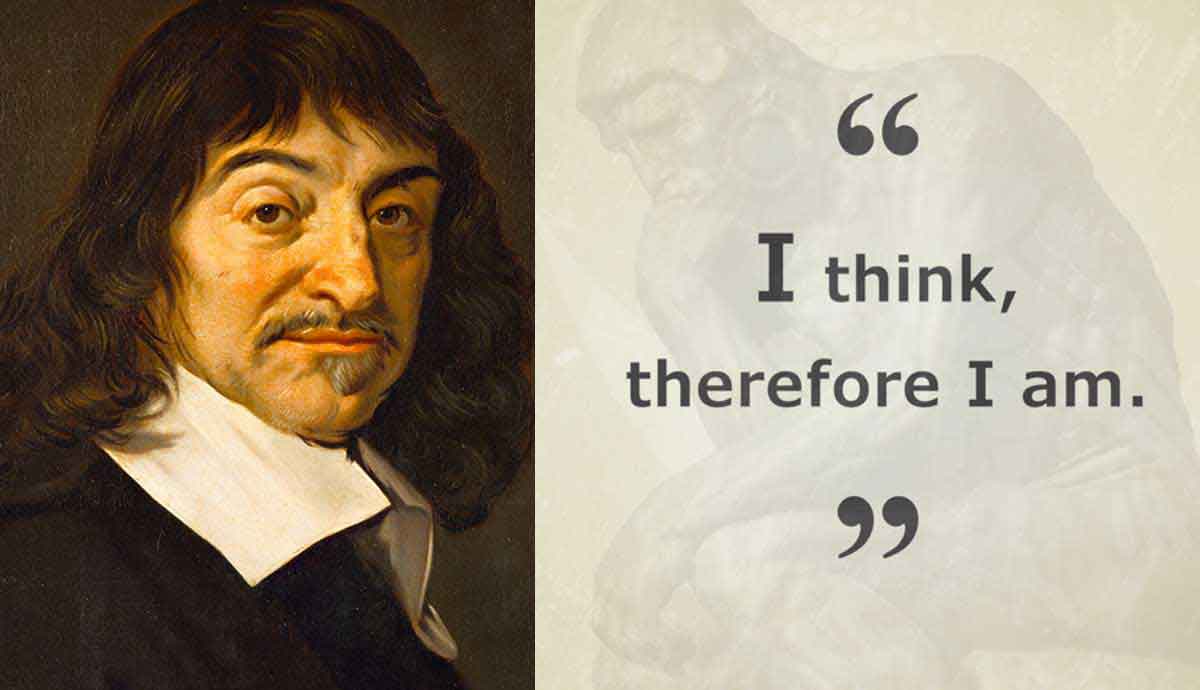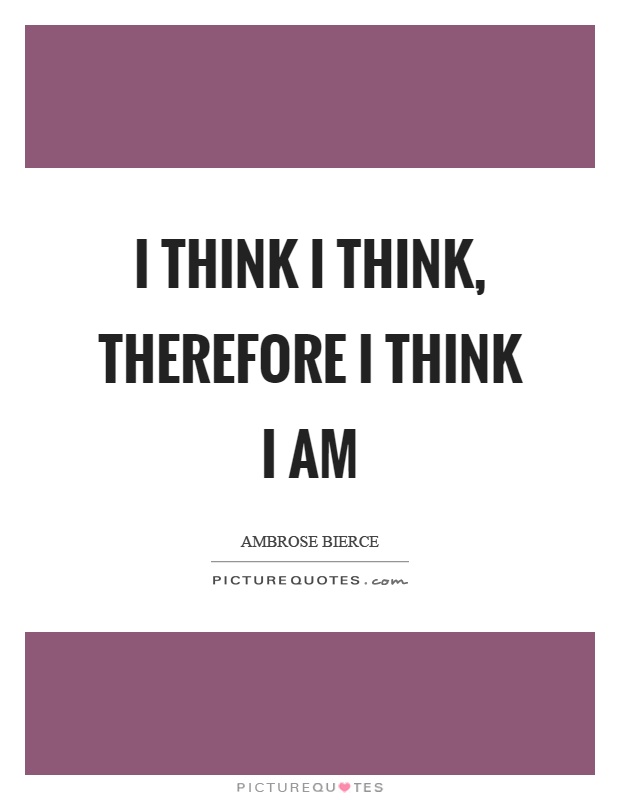
I think therefore I am Metal Print by IdeasForArtists Quotes to live
Philosopher and mathematician René Descartes is regarded as the father of modern philosophy for defining a starting point for existence, "I think; therefore I am." Updated: Aug 8, 2023 Photo.

What Does “I Think, Therefore I Am” Really Mean?
Context of the phrase "I think, therefore I am" René Descartes was a French philosopher and mathematician who was born in 1596 and died in 1650.He is considered the father of modern philosophy as well as the founder of European rationalism.Of all his contributions to philosophy, the most significant are Cartesian doubt and cogito ergo sum, "I think therefore I am".

René Descartes Quote “I think therefore am.” (12 wallpapers) Quotefancy
A few thoughts on thinking, along with 10 rewarding aphorisms.

René Descartes Quote “I think therefore am.”
In my opinion, "I think therefore I am" is egocentric because could really stem from an illusion of the thoughts belonging to an owner, and I don't really see why a thought couldn't exist on its own? It may be the definition of a thought but that's just semantics, isn't it?

23+ Rene Descartes Quotes I Think Therefore I Am Background
I think therefore I am is a philosophical statement that was made by René Descartes in 1637. This is one of the most influential phrases ever stated. It is commonly interpreted as follows. Your Existence I think therefore I am is commonly interpreted as a logical proof that you exist.

René Descartes Quote “I think therefore am.” (12 wallpapers) Quotefancy
e The Latin cogito, ergo sum, usually translated into English or latin as " I think, therefore I am ", [a] is the "first principle" of René Descartes 's philosophy. He originally published it in French as je pense, donc je suis in his 1637 Discourse on the Method, so as to reach a wider audience than Latin would have allowed. [1]

Descartes "I think therefore I am" Quote Poster Zazzle
5 minutes Rene Descartes - "I think, therefore I am" Updated Tuesday, 14 April 2015 Stephen Fry explains Rene Descartes argument 'Cogito Ergo Sum' - 'I think, therefore I am'. Find out more about The Open University's Philosophy courses "I think, therefore I am" This is Descartes' famous Cogito argument: Cogito Ergo Sum.

René Descartes Quote “I think therefore am.”
The famous French philosopher and mathematician René Descartes (1596-1650), known as the Father of Modern Philosophy, declared "I think therefore I am." Much of his work attempted to defy skepticism, a prominent ideology for the French intellectuals of the day.

I think I think, therefore I think I am Picture Quotes
Rene Descartes, French mathematician and philosopher, generally regarded as the founder of modern Western philosophy. He is known for his epistemological foundationalism as expressed in the cogito ('I think, therefore I am'), his metaphysical dualism, and his rationalism based on innate ideas of mind, matter, and God.

"I think therefore I am" Sticker for Sale by dailyfeminist Redbubble
Thinking things exist. Therefore, I exist, at the very least as a thinking thing. "I think; therefore, I am" is a truncated version of this argument. It is perhaps better summarized as "I.

I think; therefore I am Poster
Descartes' Epistemology. First published Wed Dec 3, 1997; substantive revision Mon Nov 27, 2023. René Descartes (1596-1650) is widely regarded as a key figure in the founding of modern philosophy. His noteworthy contributions extend to mathematics and physics. This entry focuses on his philosophical contributions to the theory of knowledge.

I Think Therefore I Am Brain Quotes Minimalist Print Etsy
Cogito, ergo sum, (Latin: "I think, therefore I am) dictum coined by the French mathematician and philosopher René Descartes in his Discourse on Method (1637) as a first step in demonstrating the attainability of certain knowledge. It is the only statement to survive the test of his methodic doubt.

I think, therefore I am WordZz
What Does "I Think, Therefore I Am" Really Mean? René Descartes' observation that "I think, therefore I am" is one of philosophy's most famous sayings. But what does it actually mean? This article explores Cartesian thought, particularly Descartes' epistemology.

I THINK, THEREFORE I AM Poster Kaixuan Keep CalmoMatic
9-MIN BREAK P erhaps Western philosophy's most famous statement, "I think, therefore I am" is actually a rather confusing translation of its Latin original, cogito ergo sum. A clearer translation might be, "I am thinking, therefore I exist." Even with a less ambiguous translation, however, we might still wonder why this statement is so celebrated.

I Think, Therefore I Am by Lesley Levene 9781782430247 Paperback
If you think, you are a thinking thing that exists in some way. It is a foundational knowledge claim that cannot be refuted, even in the face of radical doubt. The History "I think, therefore, I am" was first purported by 17th century French philosopher Rene Descartes in its Latin form: Cogito, ergo sum. Descartes had become disillusioned.

WORD STUDY DO THOU IT עשׁה Chaim Bentorah
"I think, therefore I am" or "cogito ergo sum" is related to conceiving one's own existence. Let's delve into this quote by René Descartes. The meaning of this famous Descartes quote may seem obvious, along with the fact that we are rational beings with the ability to think about the world around us.